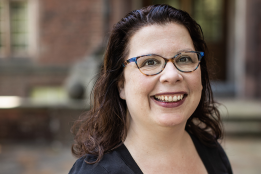Joining astronomy and politics for a career in space policy
“My politics professors were huge points of support for me and helped me determine what I wanted to do in the space policy field. Being able to present my work to people working in the industry as an underclassman was awesome.”
Sabrina Farrar has always been fascinated by space. Growing up, she and her family would watch “Cosmos: A Spacetime Odyssey” with Neil deGrasse Tyson. “Watching that show was the only time I was able to stay up past my bedtime, so it quickly became something I enjoyed,” Farrar said.
In high school, the Ramsey, New Jersey, native made sure to get involved in as many STEM classes and projects as she could. In doing so, she began to notice a theme: the classes were overwhelmingly male dominated, much like the STEM field itself. So when it came to choosing a college, she intentionally looked for a campus that would offer her an intimate experience where all voices could be heard. Enter: Mount Holyoke.
“I was one of two girls in my high school physics class. Coed education is important, but having a space that is for women, trans women and men and nonbinary students where everyone is able to fully express their opinions was everything I hoped it would be,” she said. “The College creates a space that uplifts and empowers inside the classroom and ensures that different perspectives are explored while also building confidence in me and the people around me.”
Being able to build her confidence has led Farrar to do things she never imagined. During the 2021–2022 school year, she participated in a student independent research project with the support of former politics professor Bryan Nakayama. Her research on the international legal effects of small satellite constellations allowed her to merge her two majors, astronomy and politics. After spending the school year researching, she got to present her findings and ideas to industry researchers and space lawyers at NewSpace Chicago’s Student Space Congress. Her research and presentation earned her the second-place prize at the event.
“My politics professors were huge points of support for me and helped me determine what I wanted to do in the space policy field. Being able to present my work to people working in the industry as an underclassman was awesome,” she said. “I had my heart set on international space policy as a career, but that experience affirmed that I can do it and that I have all the skills and training that I can continue to refine as I get more experience and schooling under my belt.”
If presenting her own research and placing in a nationwide competition weren’t enough, Farrar also had the opportunity to study under NASA and NSF-funded astronomist Darby Dyar. After taking a class with Dyar, Farrar asked her to serve as her academic advisor, a decision she says shaped her undergraduate career and prepared her well for her master’s studies.
“I feel incredibly lucky to have studied under someone like Darby Dyar. She is the deputy principal scientist for the VERITAS Mission to Venus and one of the few female deputy principal scientists in NASA history,” Farrar said. “It’s incredible to have such a close one-to-one connection with her, and I’m grateful for how she’s guided me through these last several years.”
In the spring, Farrar will graduate with a bachelor’s degree in astronomy and politics and then finish her master’s degree in the fall through the joint BA/MA program in Geneva, Switzerland. Her studies at the Graduate Institute in Geneva will focus on international studies with a concentration in conflict, peace and security. She will graduate from the master’s program in spring 2025.
Although an unlikely pairing to some, Farrar has been adamant about pursuing astronomy and politics equally because of the collaborative nature of both fields. “Of all the sciences, space is the most unique because it’s impossible for any one country to do research completely on their own,” Farrar said. “If you think about international conflict, space collaboration is an important point of connection that maintains diplomatic ties between nations.”
Longterm, Farrar sees herself working for NASA or the European Space Agency to promote space collaboration on an international level. She’s also open to taking the Foreign Service Exam to become a diplomat for the United States Department of State. Regardless of the route she takes, she’s confident in her next steps because of the skills she gained while at Mount Holyoke.
“My undergrad experience has taught me to be confident and sure of myself. I’ve learned my voice matters, and it deserves to be heard no matter how underqualified I feel,” she said. “There is still always something I can bring to the table that others don’t. My opinion matters, no matter the context that I’m speaking in. If I feel I have something to say, it’s worth saying. I didn’t feel that way before my time at Mount Holyoke.”
